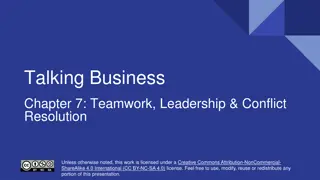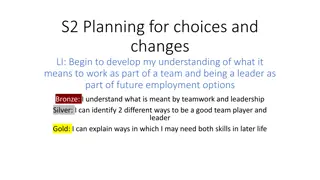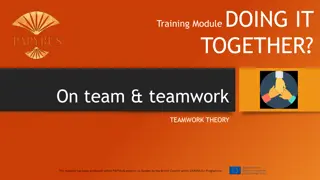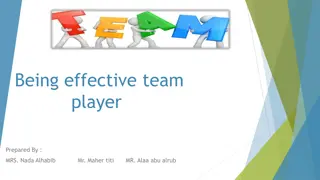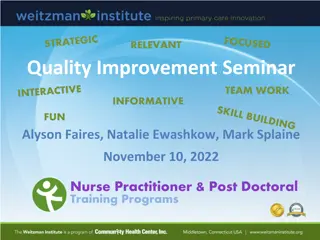The Founding Fathers on Leadership: Classic Teamwork in Changing Times
Preparing for the Revolution involves steps like sounding the trumpet, creating a vision, setting goals, and building a decisive team. Learn from the wisdom of the Founding Fathers on effective leadership in challenging times.
Download Presentation

Please find below an Image/Link to download the presentation.
The content on the website is provided AS IS for your information and personal use only. It may not be sold, licensed, or shared on other websites without obtaining consent from the author.If you encounter any issues during the download, it is possible that the publisher has removed the file from their server.
You are allowed to download the files provided on this website for personal or commercial use, subject to the condition that they are used lawfully. All files are the property of their respective owners.
The content on the website is provided AS IS for your information and personal use only. It may not be sold, licensed, or shared on other websites without obtaining consent from the author.
E N D
Presentation Transcript
The Founding Fathers on Leadership: Classic Teamwork in Changing Times By: Donald T. Phillips.
I. Preparing For The Revolution Sound the Trumpet Create a Vision, Set Goals and Involve Everyone Build Your Team and Be Decisive Inspire The Masses Mobilizing And Motivating First Listen, Then Communicate Travel with the Troops Turn a Negative into a Positive Harass, Innovate and Leverage Resources Winning The War Build Strong Alliances Attend to Financial Matters Refuse to Lose and Learn Continuously Be a Risk Taker After The Revolution Understand Human Nature Compromise and Create the Culture Stick Around and Follow Through i. ii. iii. iv. II. i. ii. iii. iv. III. i. ii. iii. iv. IV. i. ii. iii.
I. Preparing for The Revolution
Part I - Sound The Trumpet The first step in the change process involves raising awareness. Your should labor for the future rather than only for the present moment. People are bound by no law whatever that they have not approved of. Touch ordinary people with plain talk and be a good public speaker. Have no fear, and show no fear. Success will not belong to the strong alone but to the vigilant, the active, and the brave. Do not stand idle, when will you be stronger? Create an effective network of communications that will disseminate accurate information quickly. Be prepared for even the worst case scenario. Human nature is such that all people will rebel when subjected to continual coercion and oppression. It s okay to use cover and sneak up on an overwhelming competitor.
Part I - Create a Vision, Set Goals, and Involve Everyone Have a pretty good idea of where you want to go before you act or attempt to inspire others. Sense your opportunity and seize the moment. Remember that people are something of a vast and unwieldy machine and cannot be forced into anything. Make your vision simple and clear so that everyone may understand it. Begin communicating your vision slowly and softly so that others may think it over first. Invite people to participate in your vision building it with their own hands, on the broadest possible foundation. Remember that, ultimately, the people are the source of all authority and power. Collect your thoughts and set your goals down on paper. Utilize your list of goals as a vehicle for achieving your vision. Organize by forming a variety of committees to achieve your goals. Hope for the best, but prepare for the worst. Don t fire until you see the whites of their eyes.
Part I - Build Your Team and Be Decisive Create an effective team to help you achieve your vision and goals. Remember that the diversity of skills in a great team exceeds those of any one individual. Select individuals who are leaders in their own right. Doing so will allow you to achieve far more than you could yourself. It is not sufficient to be a passive friend and a well-wisher to a cause. Endeavor to make fitness of character a primary object. Try to remain optimistic even when you are in an extremely dangerous situation. Convene a council of top advisers prior to every major decision. When making a decision, gather information and understand the facts, consider various solutions and their consequences, make sure that the decision is consistent with your objectives, and effectively communicate your decision. During critical situations, be with your troops on the mountain or in the field. Make an aggressive maneuver when you sense the competition is in a defensive posture. Spit not into the fire.
Part I - Inspire The Masses Inspiration includes an element of emotion that propels people to take action on their own initiative. Encourage others to take the lead. Analyze your situation with a childlike point of view, with no past biases. Only through plain talk can the great masses of people be mobilized toward a single line of thinking. Craft your writing for the spoken as well as the written word. Remember, the less sophisticated story remains entrenched. Issue an eloquent call to action. A reversal of assumptions that mire people in their existing paradigm is critical to every major transformation. Communicate in terms so plain and firm as to justify yourself in the stand you are compelled to take. Elevate your cause to a higher level one that will inspire people. Read all major communications to the troops. Rally every member of the organization to a common cause.
Part II First Listen, Then Communicate Communicate your messages with simplicity, consistency and clarity. Communicate in total, without filters or editing. Provide a forum where people can hear the message together and discuss it together. Bringing people together from distant regions helps to bridge gaps in communications. A primary element in your overall strategy should involve disseminating and receiving timely information. Be a frequent reader of the controversial literature of the day. You do not need to speak for more than 10 minutes at a time, nor to any but the main point. Do not act without asking. Take time to verify key information. Listen, then speak; follow, then lead. When things look darkest, stay optimistic and positive; plan an offensive. Create flying camps in your organization. Work by day, think by night. Remember that one inspiring communication can turn the tide.
Part II Travel with the Troops Hold regular, informal gatherings that provide enjoyable opportunities for immediate and continuous personal communications. Remember that two-way communication has a tendency to create and strengthen emotional bonds. To form a just idea, you must be on the spot. Keep people out of trouble by keeping them busy. Link your mission to a greater cause. Provide people with a broader understanding of what they are really fighting for. Lead by example. When in a desperate situation, head down to the river and personally supervise the entire operation. Retreat when you must. Live to fight another day. During periods of relative inactivity, harass. Ride to the sound of the guns. The more frequent human contact, the more progress will be achieved. When outnumbered, keep at a distance. Neither fight nor totally run away.
Part II Turn a Negative into a Positive When the competition thinks your down for the count, you have the opportunity to achieve a major victory. March while the competition is still sleeping. Ride to the front and motion for the troops to follow. Rest when necessary, but stay close to the competition so as to keep a watchful eye on their actions. There is a three-to-one advantage in favor of the proactive party. Constantly communicate your situation to those who may render support. Stick around when others flee. Stay near the action. Keep your sense of humor, even during the worst moments of the crisis. Share the hardships of the people you lead. Fight for your honor when it is attacked. Pull together as a team and take responsibility for your own situation. Combine an optimistic attitude with a grounded reality in what the situation is and what must be done to rectify it. Never give up.
Part II Harass, Innovate, and Leverage Resources When outnumbered put nothing at risk, unless compelled by necessity. When confronted by an overwhelming power, wear them down, wait them out, and frustrate the heck out of their leadership. Employ tactics that make your leadership seem larger than it is. When your advisers are divided, break the logjam with a decision and move forward. Frequently, the most effective way to defend is to attack. When the competition is exhausted and weak strike! After a major engagement, reward those who acted well and court-martial those acted unacceptably. Chip away at the competition picking up markets, points and allies along the way. Leverage the assets at your disposal. Make do with what you have, stretch everything to the limit, and scrounge for more. When you employ innovative and unconventional tactics, you inspire like- minded people to do the same. Don t simply allow creativity and innovation; encourage it. Be smart enough to realize you can t do it all yourself.
Part III Build Strong Alliances It is natural to think of forming alliances, especially if you are pressed. Set up a committee especially designed to pursue strategic alliances. Send out letters to various organizations testing the waters as to whether the might be inclined to enter a joint venture. Building alliances with other organizations must be a long-term effort involving effective public relations and diplomacy. Try to remain optimistic even when things look bleakest. Keep your eyes and ears open and pounce on your opportunity when it presents itself. A key strategic alliance or joint venture has the potential change the direction and momentum of your revolution. Pay attention and establish trust. By looking ahead and planning for the future, you will be able to achieve your goals. Building strategic alliances strengthens your forces, lifts morale, adds new markets, and dilutes competition.
Part III Attend to Financial Matters Remember that everyone thinks they know how to manage financial affairs, but few really can do it. When you fail to receive help from your parent organization, don t just sit there. Create your own system to solve your needs. Hunt down dishonest profiteers as pests to society. The ability of any organization is nothing more than the abilities of individuals collected. When mired in a crisis, put forth ideas then lobby to get them acted upon. When you possess abundant resources, you should nothing but system to insure success. Every organization, especially those in business, must manage financial matters well to be successful. Surround yourself with experts in financial matters, listen to them, and then act on their advice. When you cannot solve a problem with a group, turn to an expert member of the team and delegate full responsibility and authority to that individual. The larger your organization, the more you must delegate.
Part III Refuse to Lose and Learn Continuously Never give up and never give in. Do not lose sight of your overall mission or be distracted from taking necessary action to achieve that end. Fight back when attacked politically. With time, political enemies will often show their true colors and cut their own throats. Trust that the experience of error will enable you to act better in the future Appropriate a time to attain knowledge. Upon starting a new assignment, tell everyone that you are there to learn, not teach. Remember that all leaders must be readers. Ability to Learn + Action = Effective Leadership. When confronted with jealousy, ignore it and plow ahead with your mission. Upon arriving to assume a new leadership position, first respect the culture of the organization as it currently exists. When outnumbered, stay a step ahead of the competition until they wear down and your outnumber them. When you fight and get beaten, rise and fight again.
Part III Be A Risk Taker Even though you may have private worries, maintain and outward optimism and hopefulness. Even with a series of defeats, you may be victorious in the long run. Keep your eyes and ears open for the time you may have finally turned the tables on the competition. Have the courage to seize your one moment in time. When undertaking a crucial endeavor, immerse yourself in the details of the operation. When you have a clear advantage, prepare your next moves carefully. Before a major action, meet all the members of your team personally. Shake their hands and salute their efforts. Those who lead must be willing to take chances. Remember that, as a leader, you must be willing and prepared to accept the negative human behavior that accompanies the change process. Encourage others to take risks. When they fail urge them to try again. As a leader, you are an agent of change. The greater the risk, the greater the glory.
Part IV Understand Human Nature New problems are often created after a revolution is won. After a common enemy has been vanquished, or an overarching mission achieved, members of the organization often exhibit a tendency toward isolationism. Once people slip into an isolationist mode, they often become jealous and suspicious of one another. In the wake of victory, be prepared to put down many mini-rebellions. Slow progress toward economic prosperity causes members of the organization to question the intelligence and competence of their leaders. It is much easier too inspire movement of the masses during a crisis situation than in a time of relative peace. A period of transition can be more dangerous and turbulent than war itself. Remember that whenever there is an interest and power to do wrong, wrong will generally be done. Take the best people as they are, since you cannot have them as you wish. Changing times require new approaches an ideas. Understanding human nature not only allows you to comprehend the motives and reactions of the people you lead, it also helps you improve yourself. There was never a good war or a bad peace.
Part IV Compromise and Create Culture Form a culture that will consistency, stability and dignity to your organization. Combine the past with the present to build a bridge to the future. Turn an unsuccessful event into a clarion call for action. When contemplating some big changes, keep out people with special interests. Include only those who want to do the right thing. When forming a strategy team, consult rather than contend with each other. Positiveness and warmth on one side naturally beget their like on the other. In order to secure a major achievement, you must prepare in detail ahead of time. The better any man is, the lower the thoughts he has of himself. Create small committees to resolve big issues. Search for a common ground and create a Win/Win situation. Remember that compromise is the tool of a true leader. People will die for a cause, but not a job. Don t forget that winners attract winners. Construct your culture with simplicity, flexibility, and elasticity so that it will be able to suffer hard knocks with little damage. Always remain optimistic. See a rising sun rather than a setting sun.
Part IV Stick Around and Follow Through Remember that initial reaction to significant change often involves outrage bordering on hysteria. When introducing radical change, be prepared to be attacked personally both verbally and physically. It is in the nature of people to pursue their own interests. Think of every possible question that might arise in opposition to your plan and then come up with questions to those answers. Counter scare tactics from the opposition by immediately refuting false charges. Seize the initiative to educate people through the mass communication methods of the day. Consult with trusted advisors prior to making appointments or establishing precedents. Leaders act as agents of change for the majority of people they represent. In order to get to know them better, take your top executives on a fishing expedition or some similar enjoyable trip. Successful leaders do not sit back and rest on their laurels. The fire of a truly great leader is always burning. Develop future leaders. Pass the torch to the next generation.


